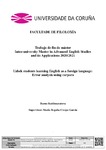Uzbek students learning English as a foreign language: Error analysis using corpora

Ver/
Use este enlace para citar
http://hdl.handle.net/2183/29788Coleccións
Metadatos
Mostrar o rexistro completo do ítemTítulo
Uzbek students learning English as a foreign language: Error analysis using corporaAutor(es)
Director(es)
Crespo, BegoñaData
2021Centro/Dpto/Entidade
Universidade da Coruña. Facultade de FiloloxíaDescrición
Traballo fin de mestrado (UDC.FIL). Estudos ingleses avanzados e as súas aplicacións. Curso 2020/2021Resumo
[Abstract] he current study analyzes various types of errors that occur in IELTS academic writing essays by learners of English as a foreign language with the first language being Uzbek.A corpus of overall 40 written essays wascollected in the form of a case study to determine the major types of errors from undergraduate students of English philology at Urgench State University, Uzbekistan. The corpus was uploaded to the Sketch Engine platform for compiling and further analysis. Collected essays were checkedfor errors, which were then extracted, classified into 13 different categories based on specific aspects those errors possess.The results obtained in this work represent that the most common types of errors Uzbek EFL learners are prone to are spelling, article, punctuation, as well as word choice ones, while sentence structure, linking word, and confusing expression types of errors occur rarely.Our study presents some interesting insights for error analysis, including gender-based error frequency comparisons, as well as explanations of reasons why some common error types occur more than others using contrastive analysis between the Uzbek and English languages.Analyzing the written errors of EFL learners is considered as a crucial basis for identifying the parts of the language problematic for the learners and determining the right methodology to make the best of the learning process.
Palabras chave
Uzbek students
English foreign language
Corpus Compilation
Academic writing
Language errors
English foreign language
Corpus Compilation
Academic writing
Language errors
Dereitos
Os titulares dos dereitos de propiedade intelectual autorizan a visualización do contido deste traballo a través de Internet, así como a súa reproducción, gravación en soporte informático ou impresión para o seu uso privado e/ou con fins de estudo e de investigación. En nengún caso se permite o uso lucrativo deste documento. Estos dereitos afectan tanto ó resumo do traballo como o seu contido Los titulares de los derechos de propiedad intelectual autorizan la visualización del contenido de este trabajo a través de Internet, así como su repoducción, grabación en soporte informático o impresión para su uso privado o con fines de investigación. En ningún caso se permite el uso lucrativo de este documento. Estos derechos afectan tanto al resumen del trabajo como a su contenido





